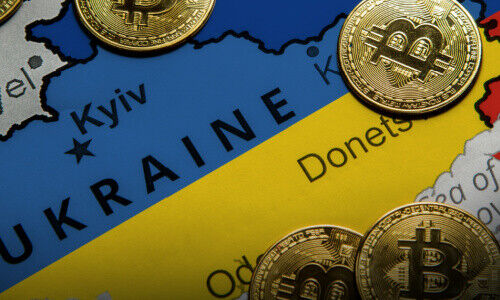The Ukraine war shows cryptocurrencies' usefulness during a crisis, although some fear they are being used to circumvent sanctions.
So far the Ukraine government has collected $61.5 million in cryptocurrency donations, according to an online page it recently set up to receive payments.
Beyond Kyiv's government’s endorsement of digital currencies, «the war in Ukraine is a gamechanger for the adoption of cryptocurrencies by aid agencies, organizations and charities,» says Friedbert Ottacher, who advises non-governmental organizations (NGOs) on how they can use blockchain in their development work.
Wider Donor Crowd
The advantages of adding decentralized currencies to its funding streams for a country whose economy is being savaged by war are clear. Besides the immediacy of transactions, it can also benefit from a wider donor crowd and target groups used to do most things online.
Those fleeing war zones, fortunate to have savings, are also seeing the benefits of converting these into crypto money.
«Banks could be closed on the weekend and cash could be stolen from refugees trying to escape, not to mention, the devaluation of fiat money as an effect of the war,» Eliezer Ndinga, director of research at 21 Shares said.
Eco-Friendly Crypto?
Charities and NGOs have been slow to embrace crypto due to concerns around the high energy consumption required to secure crypto transactions, which still acts as a deterrent for many, according to Ottacher.
When charities first included cryptos into their fundraising mix in 2017, the reputational risk of being associated with a currency also used by criminals weighed heavily on them.
«Some charities set up separate pages with their crypto wallet details to avoid disturbing their traditional donor crowd, which typically consists of older people,» Ottacher said. However in the meantime organizations such as SOS, UNICEF and Save the Children, all accept donations in various cryptocurrencies.
Democracy At Crypto’s Core
For Ndinga, the significance tied to using crypto in uncertain times, where democracy is under attack, goes beyond its function as a medium of exchange.
Virtual currencies are resistant to censorship, he says, pointing out that democracy is an important cause driving «Web3,» which is the next iteration of the web.
With Web3 the ownership of data, services and products are becoming decentralized and will no longer lie in the hands of governments or a few conglomerates, he said.
In this context, «the way we make payments is becoming an ever more important way of how we communicate,» he adds.
Sanctioned Oligarchs
Yet, this high-mindedness seems at odds with the fear cryptocurrencies could be used to circumvent sanctions on oligarchs with close ties to Vladimir Putin, and by those who could potentially be gaining from or contributing to his war against Ukraine.
While unregulated peer-to-peer exchanges are taking place among individuals swapping small amounts of currencies with each other in person, «the amounts that oligarchs might be looking to transfer are too big to find matches on these peer-to-peer platforms,» Ndinga said.
Transfers of such amounts into virtual currencies require an exchange, and those are regulated by local jurisdictions, he said.
Binance founder, Changpeng Zhao, also pointed out recently that transfers on his exchange were subject to the same know-your-client and anti-money-laundering processes as banks, in a «Bloomberg» TV interview.
It seems that with each economic or geopolitical crisis – whether in Venezuela, Lebanon, or in Ukraine – the benefits of cryptocurrencies are outweighing their disadvantages, and as charities warm up to them, society is too.



























